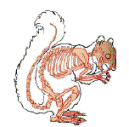 Heath Ledger in The Dark Knight (dir. Christopher Nolan, 2008).
Heath Ledger in The Dark Knight (dir. Christopher Nolan, 2008)."Welcome to a World Without Rules," reads the tag at the top of the poster for
The Dark Knight: and below it, as in so many other advertising images for action thrillers over the past few years, is a minimally adjusted representation of the World Trade Center in flames. Even though Christopher Nolan's first entry in the Caped Crusader series, 2005's
Batman Begins, was more explicitly about global terrorism,
The Dark Knight taps with greater potency into the emotional aura of post-9/11 life. The Joker is not the fantasy equivalent of Bin Laden or al-Qaeda; he's more like a frantic projection of our own damaged ethical cores, an image of the kind of anti-human consciousness one would have to summon up to feel at home in the present ruleless world.
Rulelessness, chance, and anarchy are constant themes in this thundering, mournful behemoth of a movie. One character philosophizes that a flip of a coin is the only "fair" way to decide issues of life and death, as this chance-based gesture is the most accurate model of morality as it actually works in the world. The irony, which this character is too distracted to appreciate, is that to invoke fairness in the first place belies the theory. The Joker himself would never make such a claim: he is absolutely free from any concerns about fairness. He isn't capable of compassion, or self-doubt, or--most strikingly--fear. His own continued existence is of importance to him only as a moment-to-moment strategy for achieving his primary objective, which is, as he puts it, "fun."
The malevolent
jouissance Heath Ledger embodies in his portrayal is so powerful it's almost too much to take in in one viewing. He's more believable and more terrible than any other Joker to date, including Jack Nicholson. Nicholson was funny, grotesque, and stylish, but not really scary--not this scary, anyway. Ledger is funny, too--like a heart attack. His "disappearing pencil trick" cements our understanding of his nature early on, even as it gets a big guffaw from the audience: we find ourselves gulping in mid-laugh.
The rest of the cast is excellent as well, but Ledger dominates to such an extent that any rehearsal of their virtues would be anticlimactic. And at any rate, other than the Joker, it's the total look and sound and mood of the film that one walks away remembering. Also its length: at two and a half hours, it starts to take on the feel not so much of an epic, but of a mini-series. I mean this in a good way: as in a season of
The Sopranos or
Deadwood or
The Wire, part of the impact comes from spending so much time with the characters that when things take a drastic turn, it hits harder.
As I said, there's more to process here than is possible after watching only once, which is one of the signs of a great movie--or possibly a confused one, though even if this should be the final verdict, it's confused in ways that make it worth dissecting. It's hard not to distrust how
entertaining the film is--surely anything that gives that much immediate sensual gratification must be a sham. But it's unsettling as well, and to Nolan's credit, it's not always easy to tell the difference: is it distress or pleasure with which we watch the world burn? And if our distress becomes the same as our pleasure ... I deleted what I had typed here, because it was just too morose.







































